Diary of George Booley, 5th Battalion, AIF, 1914 - Part 5 of 8
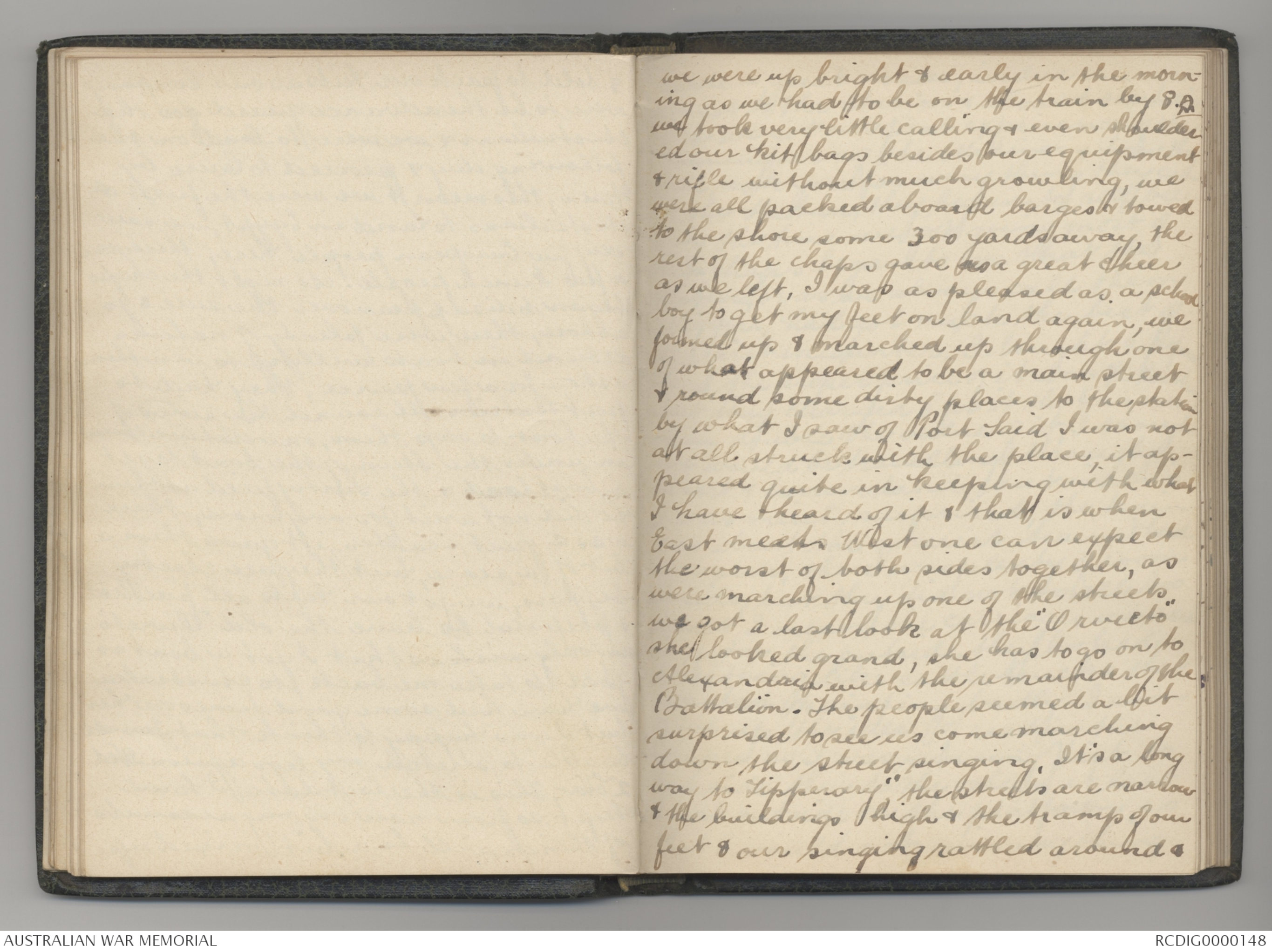
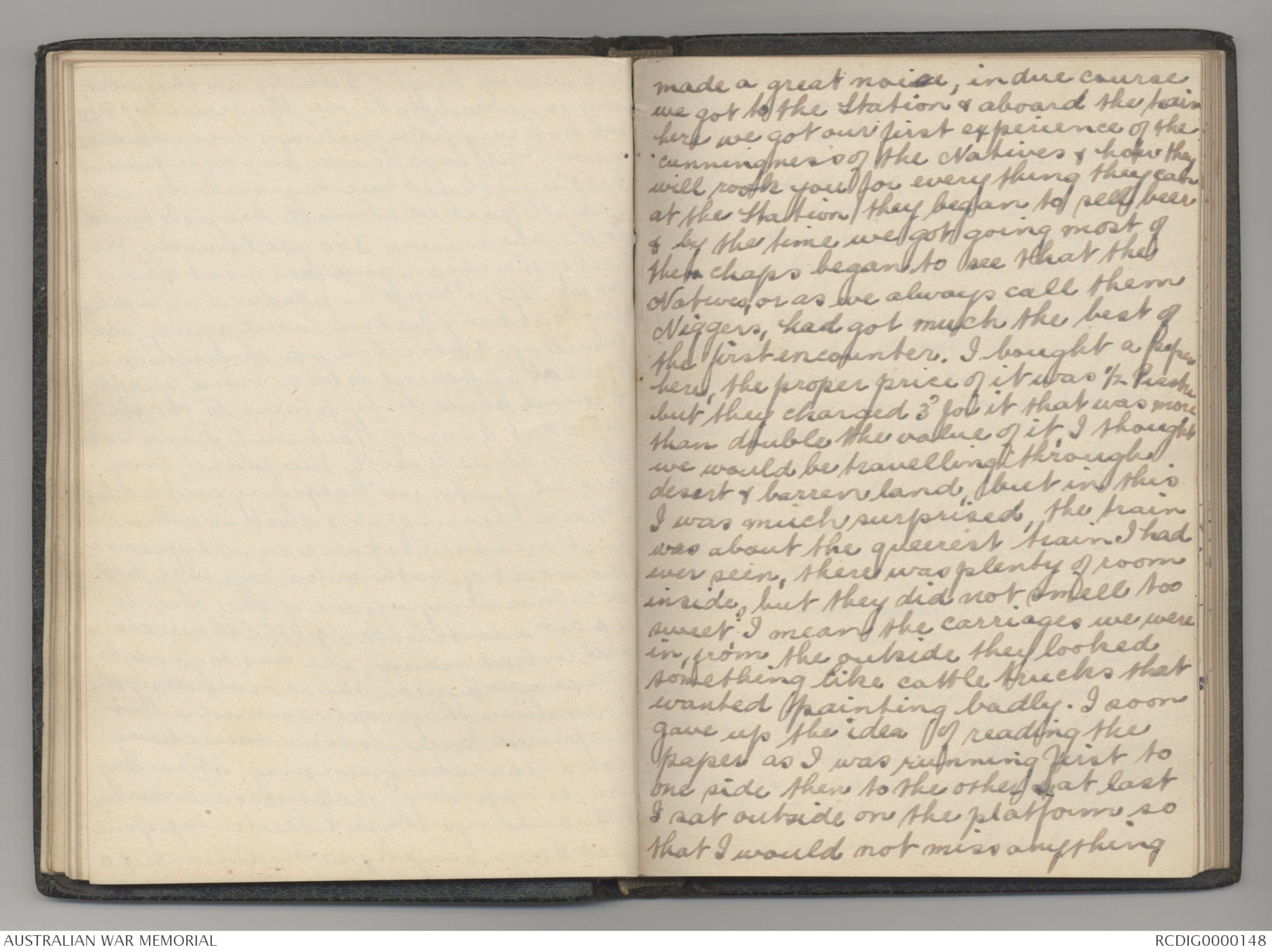
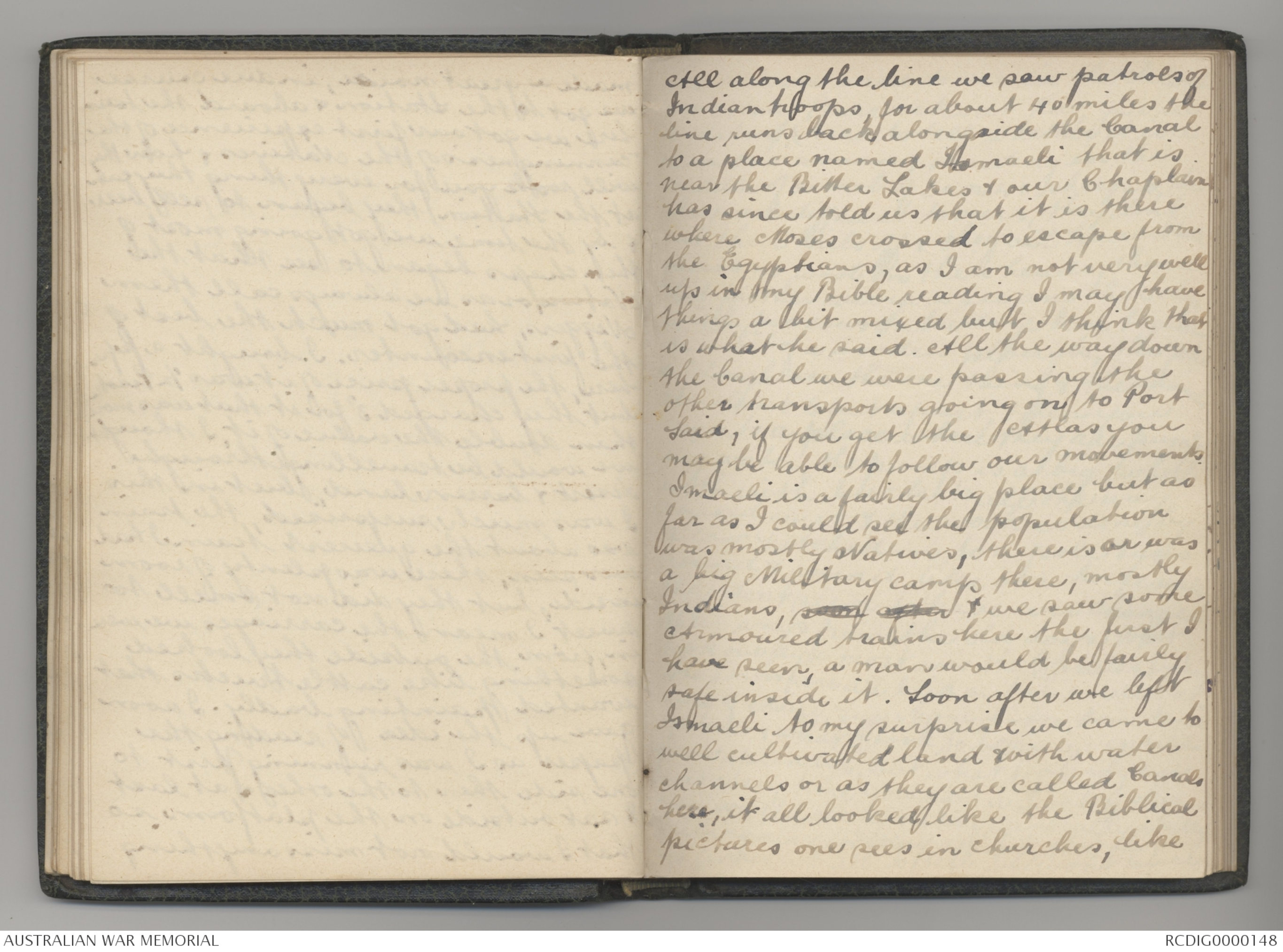
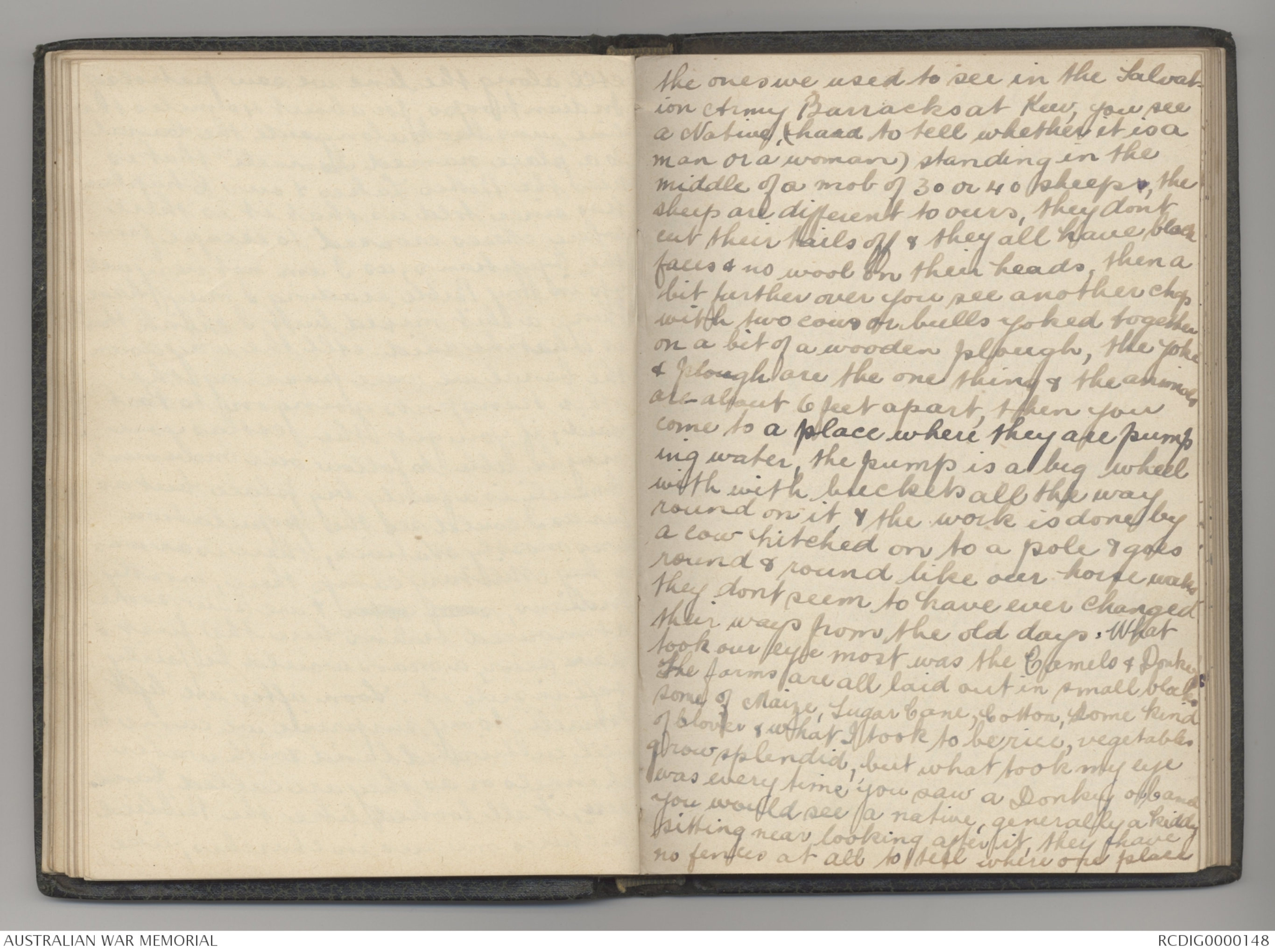
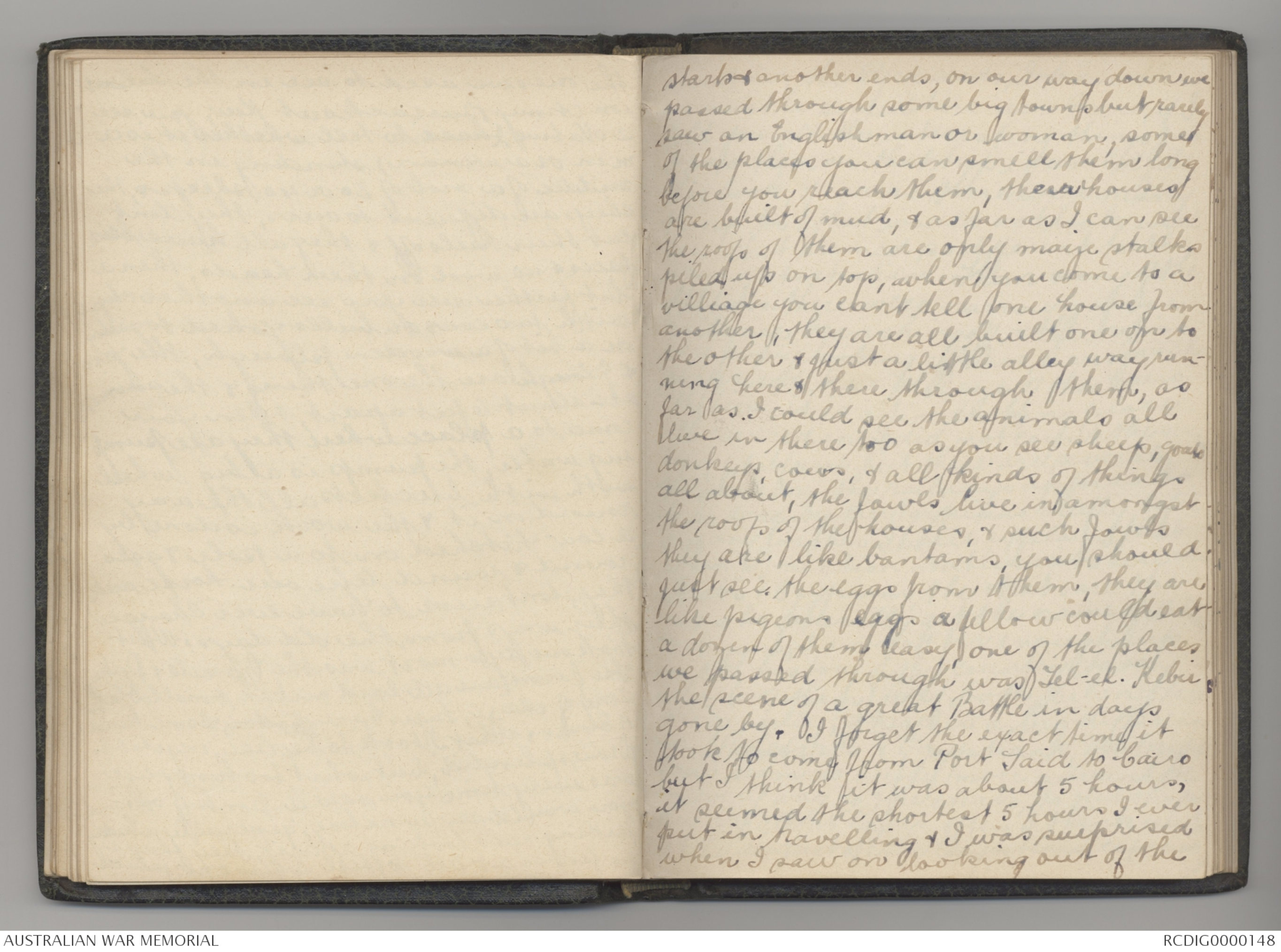
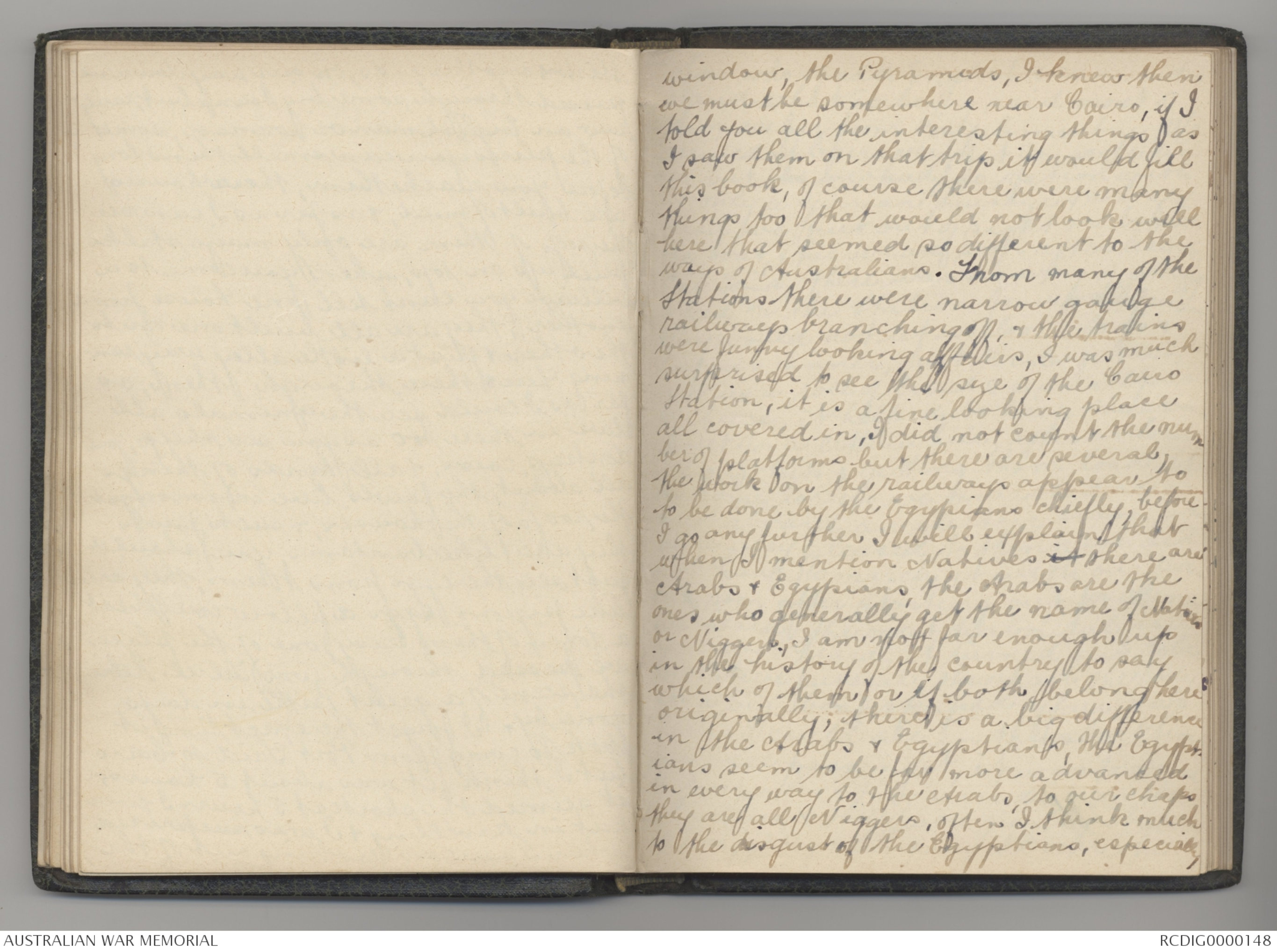
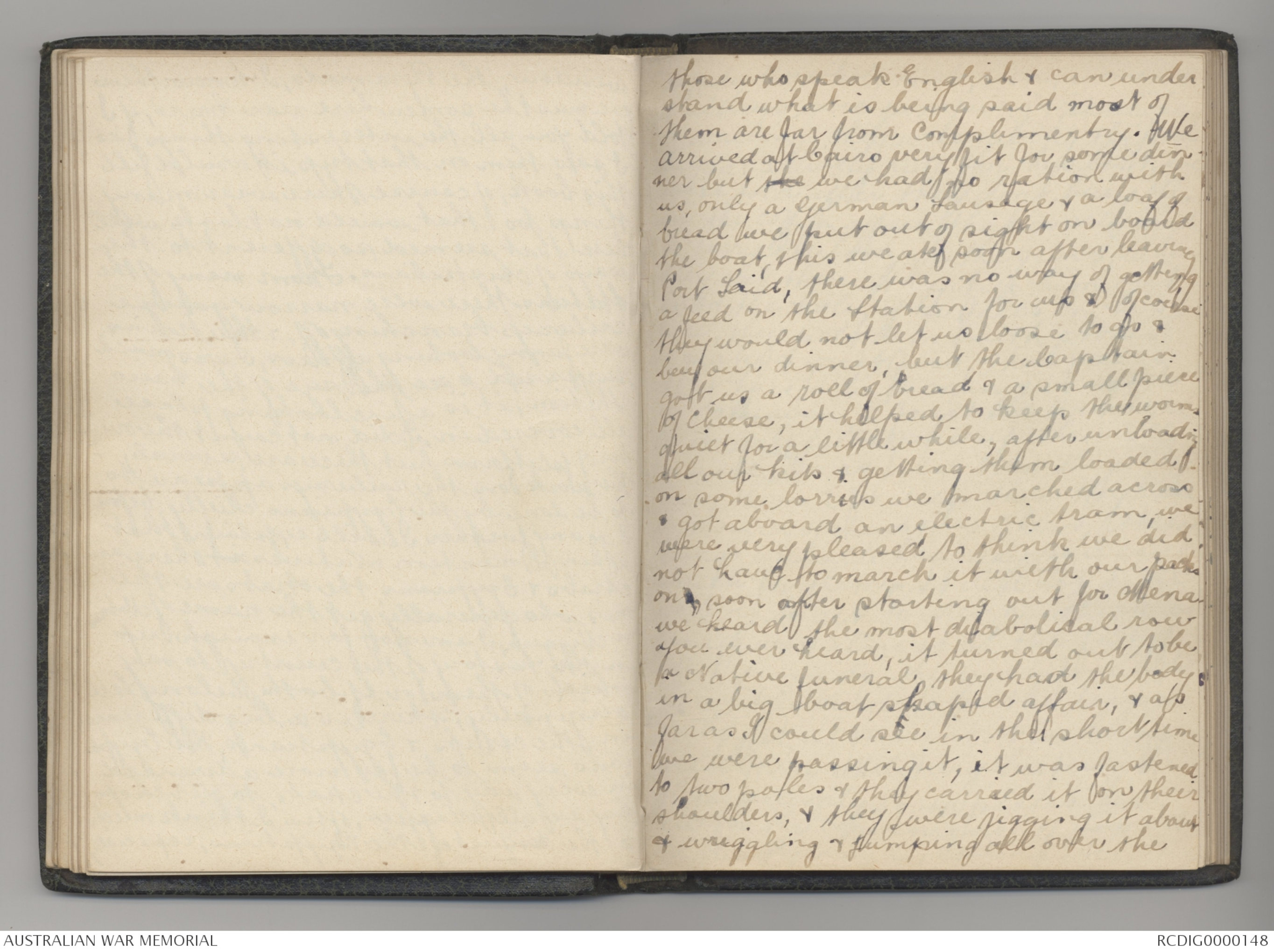
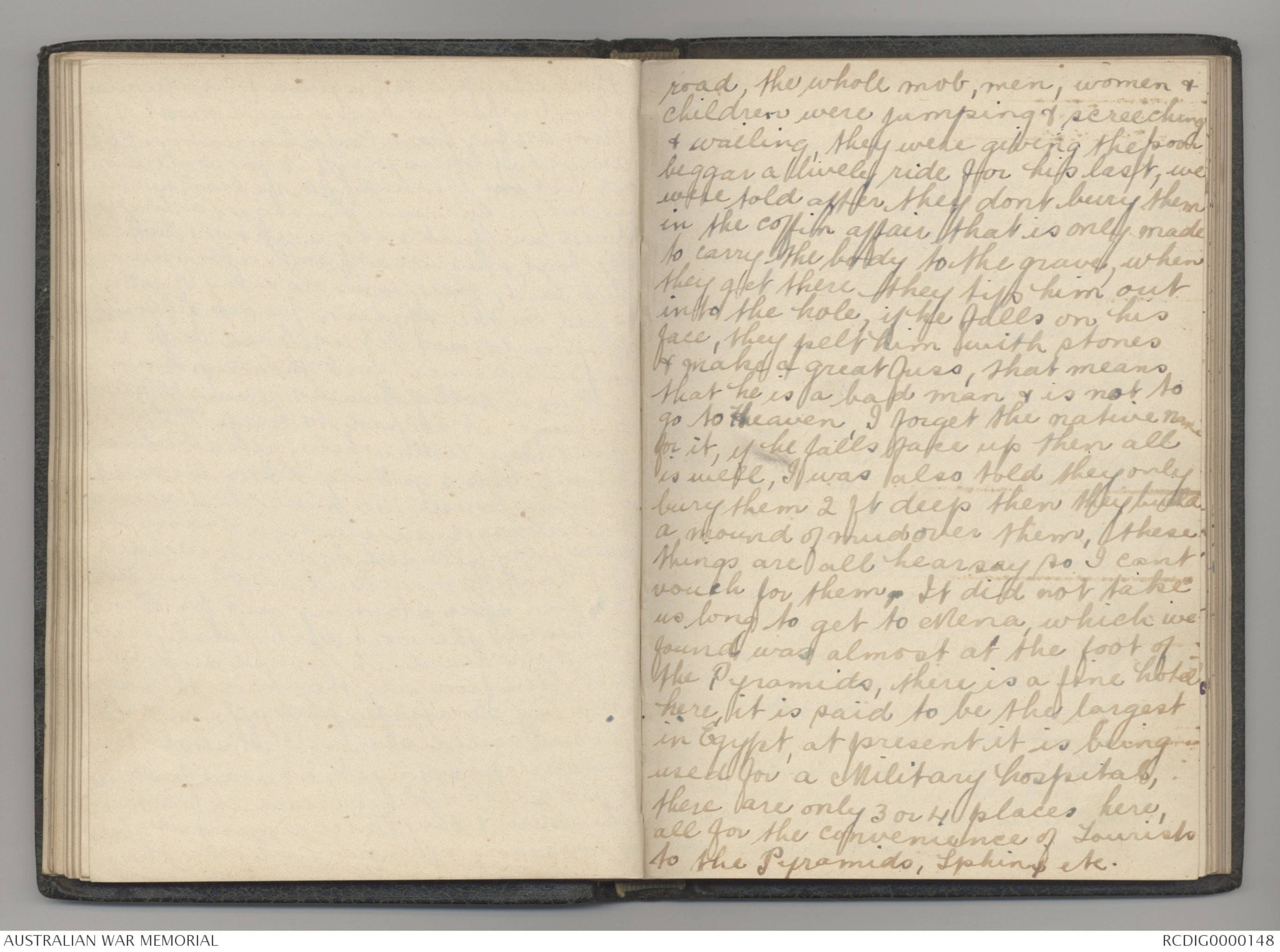
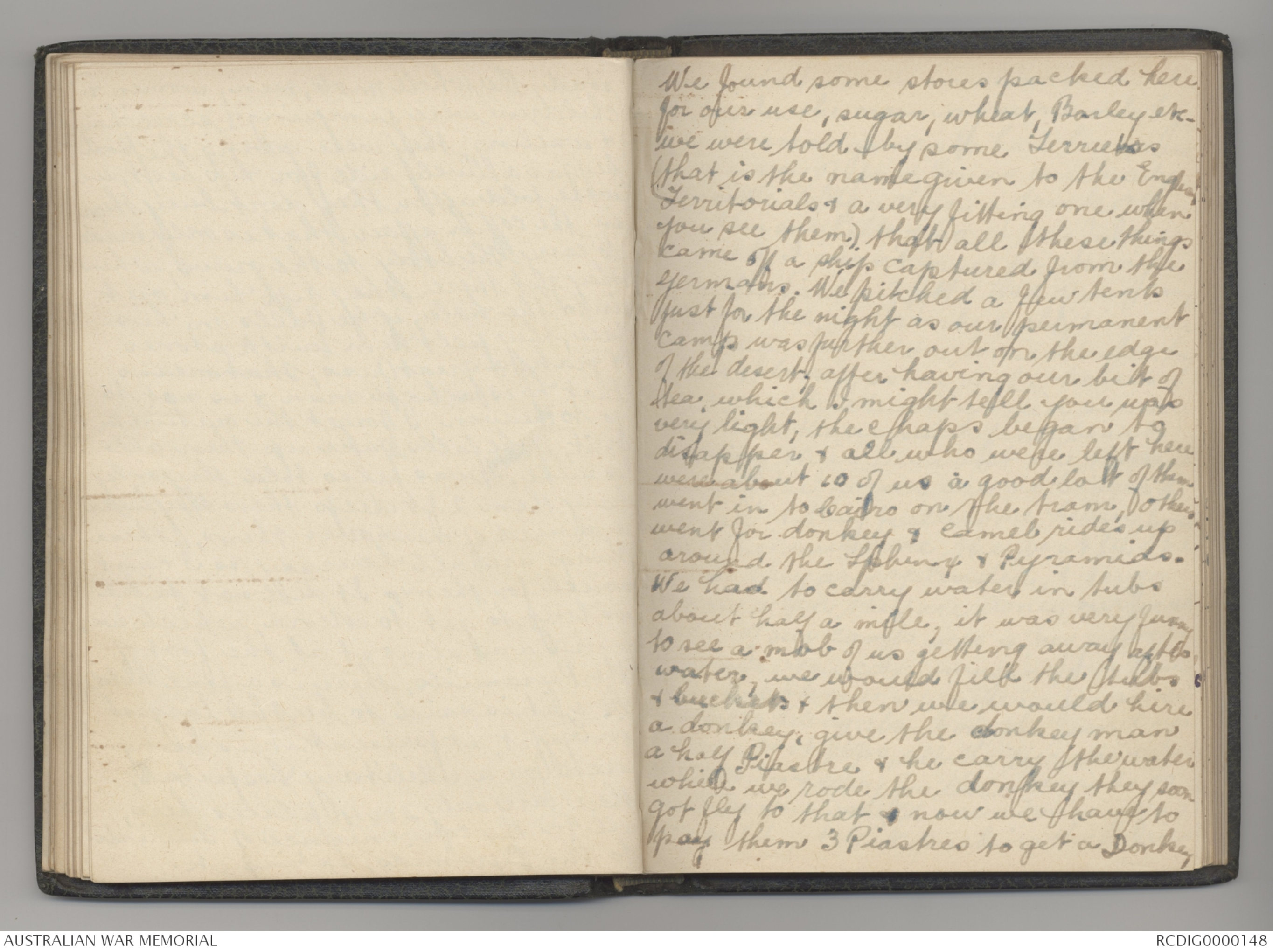
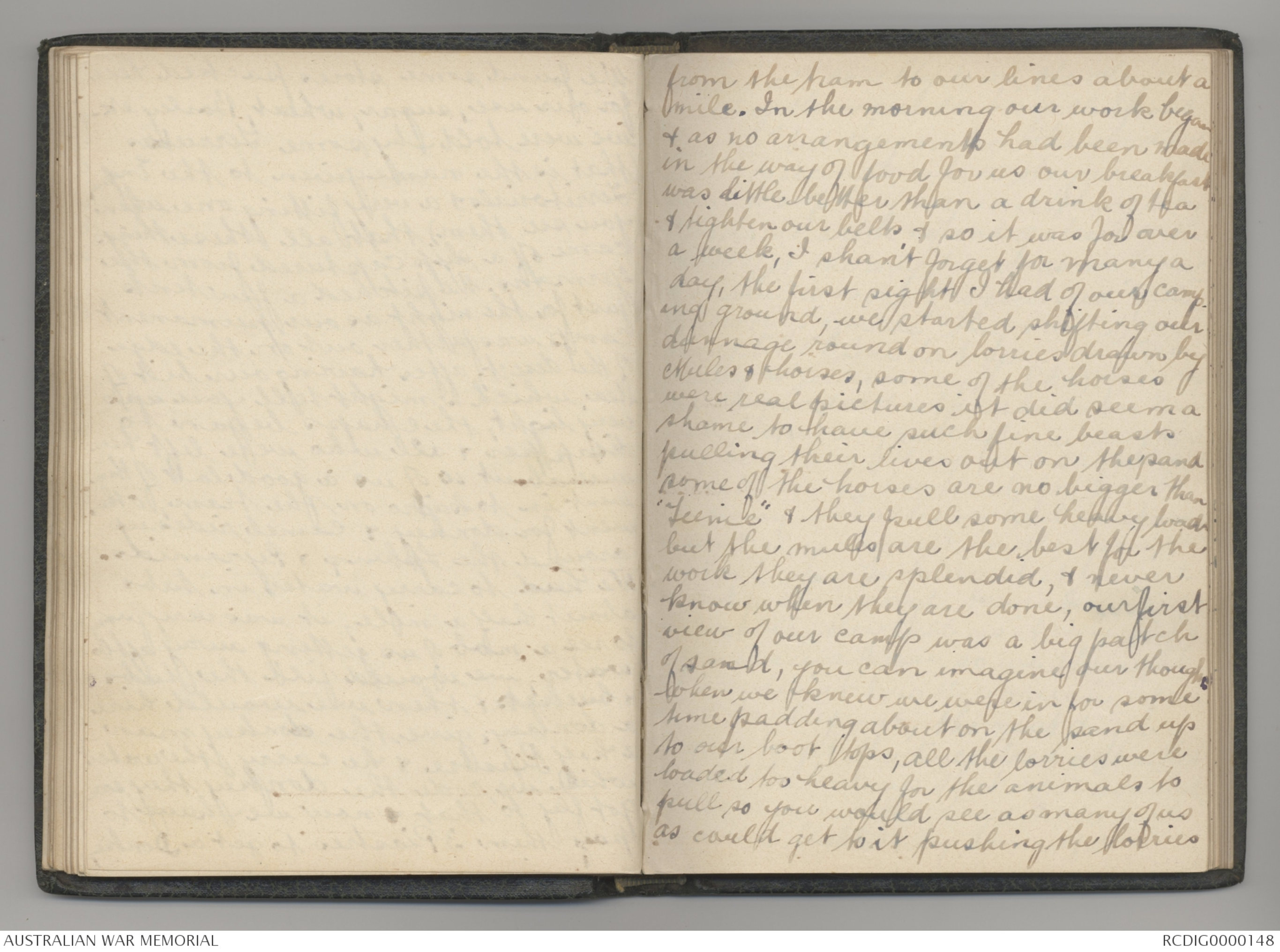
we were up bright & early in the morning
as we had to be on the train by 8.A.M
we took very little calling & even shouldered
our kit bags besides our equipment
& rifle without much growling, we
were all packed aboard barges & towed
to the shore some 300 yards away, the
rest of the chaps gave us a great cheer
as we left, I was as pleased as a school
boy to get my feet on land again, we
formed up & marched up through one
of what appeared to be a main street
& round some dirty places to the station
by what I saw of Port Said I was not
at all struck with the place, it appeared
quite in keeping with what
I have heard of it & that is when
East meets West one can expect
the worst of both sides together, as
were marching up one of the streets,
we got a last look at the "Orvieto"
she looked grand, she has to go on to
Alexandria with the remainder of the
Battalion. The people seemed a bit
surprised to see us come marching
down the street singing. It's a long
way to Tipperary", the streets are narrow
& the buildings high & the tramp of our
feet & our singing rattled around &
made a great noise, in due course
we got to the Station & aboard the train
here we got our first experience of the
cunningness of the Natives & how they
will rook you for everything they can
at the Station they began to sell beer
& by the time we got going most of
them chaps began to see that the
Natives, or as we always call them
Niggers, had got much the best of
the first encounter. I bought a paper
here, the proper price of it was 1/2 Piastre
but they charged 3' for it that was more
than double the value of it, I thought
we would be travelling through
desert & barren land, but in this
I was much surprised, the train
was about the queerest train I had
ever seen, there was plenty of room
inside, but they did not smell too
sweet, I mean the carriages we were
in, from the outside they looked
something like cattle trucks that
wanted painting badly. I soon
gave up the idea of reading the
paper as I was running first to
one side then the other at last
I sat outside on the platform, so
that I would not miss anything
All along the line we saw patrols of
Indian troops, for about 40 miles the
line runs back alongside the Canal
to a place named Ismaeli that is
near the Bitter Lakes & our Chaplain
has since told us that it is there
where Moses crossed to escape from
the Egyptians, as I am not very well
up in my Bible reading I may have
things a bit mixed but I think that
is what he said. All the way down
the Canal we were passing the
other transports going on to Port
Said, if you get the Atlas you
may be able to follow our movements.
Ismaeli is a fairly big place but as
far as I could see the population
was mostly Natives, there is or was
a big Military camp there, mostly
Indians, soon after & we saw some
Armoured trains here the first I
have seen, a man would be fairly
safe inside it. Soon after we left
Ismaeli to my surprise we came to
well cultivated land with water
channels or as they are called Canals
here, it all looked like the Biblical
pictures one sees in churches, like
the ones we used to see in the Salvation
Army barracks at Kew, you see
a Native, (hard to tell whether it is a
man or a woman) standing in the
middle of a mob of 30 or 40 sheeps, the
sheep are different to ours, they dont
cut their tails off & they all have black
faces & no wool on their heads, then a
bit further over you see another chap
with two cows or bulls yoked together
on a bit of a wooden plough, the Yoke
& plough are the one thing & the animals
are about 6 feet apart, then you
come to a place where they are pumping
water, the pump is a big wheel
with with buckets all the way
round on it & the work is done by
a cow hitched on to a pole & goes
round & round like our horse works
they dont seem to have ever changed
their ways from the old days. What
took our eye most was the Camels & Donkeys
The farms are all laid out in small blocks
some of Maize, Sugar Cane, Cotton, some kind
of Clover & what I took to be rice, vegetables
grow splendid, but what took my eye
was every time you saw a Donkey or Camel
you would see a native, generally a kiddy
sitting near looking after it, they have
no fences at all to tell where one place
starts & another ends, on our way down we
passed through some big towns but rarely
saw an Englishman or woman, some
of the places you can smell them long
before you reach them, their houses
are built of mud, & as far as I can see
the roofs of them are only maize stalks
piled up on top, when you come to a
villiage you cant tell one house from
another, they are all built one on to
the other & just a little alley way running
here & there through them, as
far as I could see the animals all
live in there too as you see sheep, goats,
donkeys, cows, & all kinds of things
all about, the fowls live in amongst
roofs of the houses, & such fowls
they are like bantams, you should
just see the eggs from them, they are
like pigeon eggs a fellow could eat
a dozen of them easy, one of the places
we passed through was Tel-el Kebir
the scene of a great Battle in days
gone by. I forget the exact time it
took to come from Port Said to Cairo
but I think it was about 5 hours,
it seemed the shortest 5 hours I ever
put in travelling & I was surprised
when I saw on looking out of the
window, the Pyramids, I knew then
we must be somewhere near Cairo, if I
told you all the interesting things as
I saw them on that trip it would fill
this book, of course there were many
things too that would not look well
here that seemed so different to the
ways of Australians. From many of the
Stations there were narrow gauge
railways branching off, & the trains
were funny looking affairs, I was much
surprised to see the size of the Cairo
Station, it is a fine looking place
all covered in, I did not count the number
of platforms but there are several,
the work on the railways appear to
be done by the Eqyptians chiefly, before
I go any further I will explain that
when I mention Natives it there are
Arabs & Egyptians, the Arabs are the
ones who generally get the name of Natives
or Niggers, I am not far enough up
in the history of the country to say
which of them or if both belong here
originally; there is a big difference
in the Arabs & Egyptians, The Egyptians
seem to be far more advanced
in every way to the Arabs, to our chaps
they are all Niggers, often I think much
to the disgust of the Egyptians, especially
those who speak English & can understand
what is being said most of
them are far from Complimentry. We
arrived at Cairo very fit for some dinner
but the we had no ration with
us, only a German Sausage & a loaf of
bread we put out of sight on board
the boat, this we ate soon after leaving
Port Said, there was no way of getting
a feed on the Station for us & of course
they would not let us loose to go &
buy our dinner, but the Captain
got us a roll of bread & a small piece
of cheese, it helped to keep the worms
quiet for a little while, after unloading
all our kits & getting them loaded
on some lorries we marched across
& got aboard an electric tram, we
were very pleased to think we did
not have to march it with our packs
on a soon after starting out for Mena
we heard the most diabolical row
you ever heard, it turned out to be
for Native funeral they had the body
in a big boat shaped affair, & as
far as I could see in the short time
we were passing it, it was fastened
to two poles & they carried it on their
shoulders, & they were jigging it about
& wriggling & jumping all over the
road, the whole mob, men, women &
children were jumping & screeching
& wailing, they were giving the poor
beggar a lively ride for his last, we
were told after they dont bury them
in the coffin affair that is only made
to carry the body to the grave, when
they get there they tip him out
into the hole, if he falls on his
face, they pelt him with stones
& make a great fuss, that means
that he is a bad man & is not to
go to Heaven, I forget the native name
for it, if he falls face up then all
is well, I was also told they only
bury them 2 ft deep then they build
a mound over them, these
things are all hearsay so I cant
vouch for them. It did not take
us long to get to Mena, which we
found was almost at the foot of
the Pyramids, there is a fine hotel
here, it is said to be the largest
in Egypt, at present it is being
used for a Military hospital,
there are only 3 or 4 places here,
all for the convenience of Tourists
to the Pyramids, Sphinx etc.
We found some stores packed here
for our use, sugar, wheat, Barley etc.
we were told by some Terriers
(that is the name given to the English
Territorials & a very fitting one when
you see them) that all these things
came off a ship captured from the
Germans. We pitched a few tents
just for the night as our permanent
Camp was further out on the edge
of the desert, after having our bit of
tea which I might tell you was
very light, the chaps began to
disappear & all who were left here
were about 10 of us a good lot of them
went in to Cairo on the tram, others
went for donkey & camel rides up
around the Sphinx & Pyramids,
We had to carry water in tubs
about half a mile, it was very funny
to see a mob of us getting away after
water, we would fill the tubs
& buckets & then we would hire
a donkey, give the donkey man
a half Piastre & he carry the water
while we rode the donkey they soon
got fly to that & now we have to
pay them 3 Piastres to get a Donkey
from the tram to our lines about a
mile. In the morning our work began
& as no arrangements had been made
in the way of food for us our breakfast
was little better than a drink of tea
& tighten our belts & so it was for over
a week, I shan't forget for many a
day, the first sight I had of our camping
ground, we started shifting our
dunnage round on lorries drawn by
Mules &horses, some of the horses
were real pictures it did seem a
shame to have such fine beasts
pulling their lives out on the sand
some of the horses are no bigger than
"Teenie" & they pull some heavy loads
but the mules are the best for the
work they are splendid, & never
know when they are done, our first
view of our camp was a big patch
of sand, you can imagine our thought
when we knew we were in for some
time padding about on the sand up
to our boot tops, all the lorries were
loaded too heavy for the animals to
pull so you would see as many of us
as could get to it pushing the lorries
 Jacqueline Kennedy
Jacqueline KennedyThis transcription item is now locked to you for editing. To release the lock either Save your changes or Cancel.
This lock will be automatically released after 60 minutes of inactivity.